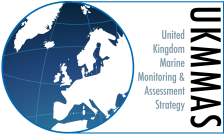Acknowledgements
The assessment and analyses presented on the Marine Online Assessment Tool have required substantial efforts and collaboration between marine policymakers at Department for Environment, Food and Rural Affairs (Defra), Department of Agriculture Environment and Rural Affairs Northern Ireland (DAERNI), Scottish Government, Welsh government) and the marine science community via the UK Marine Monitoring and Assessment Strategy (UKMMAS) and Evidence Groups. The UK Marine Assessment Reporting Group (MARG) coordinates the reporting of the evidence provided by scientists and is chaired by Defra and Marine Scotland. The secretariat is provided by Defra.
The four UK Marine Monitoring and Assessment Strategy Evidence Groups include:
-
Clean and Safe Seas
-
Healthy and Biologically Diverse Seas
-
Ocean Processes
-
Productive Seas
Additional scientific evidence is coordinated outside these evidence groups.
For each descriptor and indicator, a dedicated team of scientists from across the UK, analysed the data collected by the associated monitoring programmes and additional evidence from other sources against targets and thresholds set out in the Marine Strategy Part 1.
The UK Marine Online Assessment Tool (MOAT) was designed and developed by the Centre for the Environment, Fisheries and Aquaculture Science (Cefas) on behalf of (Defra). Additional editorial contributions were provided by Cefas scientists and technical delivery was provided by Cefas software engineers of the Application Development Team.
